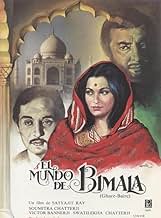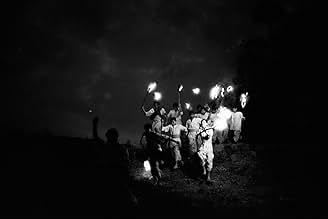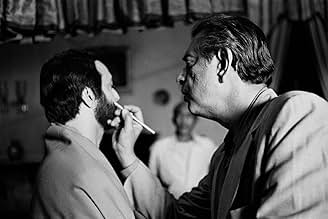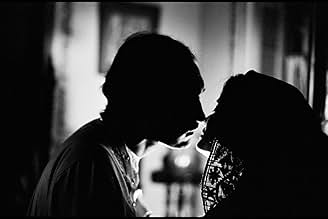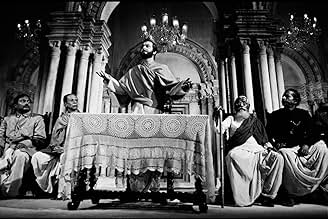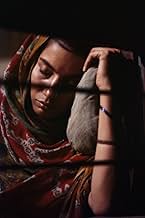NOTE IMDb
7,5/10
2 k
MA NOTE
L'inde, 1905, une société en crise. Le gouverneur général des Indes, s'appuyant sur l'antagonisme entre Hindous et Musulmans, divise le Bengale en deux, afin de mieux pouvoir perturber l'éco... Tout lireL'inde, 1905, une société en crise. Le gouverneur général des Indes, s'appuyant sur l'antagonisme entre Hindous et Musulmans, divise le Bengale en deux, afin de mieux pouvoir perturber l'économie locale et importer des produits anglais.L'inde, 1905, une société en crise. Le gouverneur général des Indes, s'appuyant sur l'antagonisme entre Hindous et Musulmans, divise le Bengale en deux, afin de mieux pouvoir perturber l'économie locale et importer des produits anglais.
- Réalisation
- Scénario
- Casting principal
- Récompenses
- 3 victoires et 2 nominations au total
Soumitra Chatterjee
- Sandip Mukherjee
- (as Soumitra Chattopadhyay)
Swatilekha Sengupta
- Bimala Choudhury
- (as Swatilekha Chattopadhyay)
Jennifer Kendal
- Miss Gilby
- (as Jennifer Kapoor)
Bimala Chatterjee
- Kulada
- (as Bimal Chattopadhyay)
Avis à la une
The movie is played with a flashback, with a womans voice over. She is describing her life and her experiences. She is Bimala, the wife of Nikhilesh, a landlord and ruler of an area in West Bengal. She was married to him at a very early age. Bimala recollects how her husband helped her discover her true self, her dreams , aspirations and how she came to understand the meaning of life and love.
Nikhilesh(Victor Bannerjee , in a class act) , is Rajababu of a province. His people look upto him , and he is benevolent in his demeanour with them. He marries Bimala , but due to the prevalent child marriage traditions , there is a significant age gap between the two. Nikhilesh encourages his wife to explore a life beyond the mundane. He treats her as an equal rather than a submissive partner. Bimala takes English lessons (Jennifer Kendal Kapoor in a cameo) on Nikhilesh's insistence. Gradually as Nikhilesh encourages her to expand her horizons, she becomes more confident. Then enters Sandeep , a revolutionary and Nikhilesh's good friend. Sandeep and Nikhilesh are contrasting personalities. Nikhilesh is silent to Sandeep's vitriolic temperament. Sandeep talks of high ideals, while Nikhilesh thinks about the ground realities. A wonderful sequence where Sandeep is advocating boycott of English goods, while Nikhilesh differs , saying that the poor traders would be affected the most, not so much the English Saab. Bimala is swayed by Sandeep's idealistic words and admires him. Nikhilesh notices the same, when she doesn't take sides, but doesn't comment. Gradually the chemistry between Bimala and Sandeep increases, and while Nikhilesh is aware of it, he defends his silence to Bimala by saying that how will he come to know how much she values him, unless she does not compare his positives and negatives with anyone else. Suddenly a series of incidents show Bimala, a side of Sandeep , that she had not envisioned. During the course of these events she realises the true meaning of Nikhilesh's words to her , and during 'that' heated discussion which he and Sandeep had. While Nikhilesh is hurt by the change in Bimala's behaviour ,he says not a word. Slowly Bimala comes to know that the love respect admiration that she had read in books, was actually Nikhilesh's feelings towards her. How, he treated her as his equal (which in those days was unheard of), broadened her outlook towards life as a whole. Nikhilesh has a heart to heart talk with Bimala ,and drives out to face a riot in the village, while the law catches up with Sandeep. Bimala is left to reminisce all the events, it sums up the movie.
Nikhilesh(Victor Bannerjee , in a class act) , is Rajababu of a province. His people look upto him , and he is benevolent in his demeanour with them. He marries Bimala , but due to the prevalent child marriage traditions , there is a significant age gap between the two. Nikhilesh encourages his wife to explore a life beyond the mundane. He treats her as an equal rather than a submissive partner. Bimala takes English lessons (Jennifer Kendal Kapoor in a cameo) on Nikhilesh's insistence. Gradually as Nikhilesh encourages her to expand her horizons, she becomes more confident. Then enters Sandeep , a revolutionary and Nikhilesh's good friend. Sandeep and Nikhilesh are contrasting personalities. Nikhilesh is silent to Sandeep's vitriolic temperament. Sandeep talks of high ideals, while Nikhilesh thinks about the ground realities. A wonderful sequence where Sandeep is advocating boycott of English goods, while Nikhilesh differs , saying that the poor traders would be affected the most, not so much the English Saab. Bimala is swayed by Sandeep's idealistic words and admires him. Nikhilesh notices the same, when she doesn't take sides, but doesn't comment. Gradually the chemistry between Bimala and Sandeep increases, and while Nikhilesh is aware of it, he defends his silence to Bimala by saying that how will he come to know how much she values him, unless she does not compare his positives and negatives with anyone else. Suddenly a series of incidents show Bimala, a side of Sandeep , that she had not envisioned. During the course of these events she realises the true meaning of Nikhilesh's words to her , and during 'that' heated discussion which he and Sandeep had. While Nikhilesh is hurt by the change in Bimala's behaviour ,he says not a word. Slowly Bimala comes to know that the love respect admiration that she had read in books, was actually Nikhilesh's feelings towards her. How, he treated her as his equal (which in those days was unheard of), broadened her outlook towards life as a whole. Nikhilesh has a heart to heart talk with Bimala ,and drives out to face a riot in the village, while the law catches up with Sandeep. Bimala is left to reminisce all the events, it sums up the movie.
I have literally no words to describe this film! Throughout the film, I felt that I was transported back to the early 20th century and watching the events unfold in front of my eyes.
Bimala, the wife of a Bengali zamindar/gentry is the main protagonist of the film. Her conflicts, her transformations (no spoilers) are the main events occuring in the film. To enjoy the flavour of the film, I would suggest you to watch the film from the POV of her.
The film illustrates the two sides of the Swadeshi movement. One group felt that Swadeshi movement was unrealistic and the poor would be hard hit. Another group, the utopian one, felt that Swadeshi would bring freedom to India.
Bimala, the wife of a Bengali zamindar/gentry is the main protagonist of the film. Her conflicts, her transformations (no spoilers) are the main events occuring in the film. To enjoy the flavour of the film, I would suggest you to watch the film from the POV of her.
The film illustrates the two sides of the Swadeshi movement. One group felt that Swadeshi movement was unrealistic and the poor would be hard hit. Another group, the utopian one, felt that Swadeshi would bring freedom to India.
One doesn't expect anything other than excellence from the legendary Ray's work and 'Ghare Baire' (Home and the World) follows the same path. 'Based on the Nobel prize winner, Ranbindronath Tagore's novel, it focuses on the relationship of a woman with her husband and his best friend. Almost 10 years into her marriage, she is happy with her husband but craves for something more. Unlike many women of the time, her husband gives her complete freedom allowing her to live her life the way she wills. He himself is impressed by the British lifestyle and his his wife learn English. He's also very connected to his own Bengali route. Then enters his revolutionary and stubborn friend who is obsessed of having the country get rid of everything English. The husband and his friend have contradictory viewpoints. Yet, he welcomes his friend and never objects to his motivations, as long as he's within his limits. The wife is impressed and intrigued by his friend's political ambitions and is gradually drawn towards him (or he draws her towards him) until they embark in an affair and then the truth becomes more apparent...to everyone, but it's too late.
Ray really takes his time to tell us the story, to let us get to know the characters and clearly display the relationships between them and explain the political situation. He does one hell of a job doing it. He shows the development of the wife's 'relationship' with the friend as her marriage becomes weaker while her husband is hauntingly passive yet trying to understand both his wife and his friend as he is the one who truly loves her and he tries to carry out his social obligations towards his people. We see that the wife learns more about the political dilemmas in the outside world but only from the friend's point of view. Then, as one reviewer, has pointed we are drawn into a web of dilemma's between England and India, modernism and tradition, Hindu and Muslim, rich and poor, men and women, leadership and rabble-rousing, greed and sacrifice, means and ends and love and infatuation.
Master filmmaker that he is, Ray puts it all together in one of the most remarkable way that it does not deviate from the main plot. Ther performances are superb. Victor Bannerjee gives a very intense but subtle performance. In the end, one realizes that it is his character one feels most for. Contrastingly, though Soumitra Chatterjee is more vocal, he makes full use of his nonverbal language, hinting the character's deceitful intentions. Swatilekha Chatterjee plays a very difficult part with tremendous ease. She completely owns the role. Supporting cast are all very good. Ray also makes adequate use of the background score and the cinematography is wonderful. Watch for the camera angles and movement.
Truly a mind-blowing film and I always thought that there aren't enough words that can do justice to describe the excellence of Ray's films. I've only made an attempt and I'm still far behind. Just watch it to see what I mean. Only those who appreciate real cinema will understand.
Ray really takes his time to tell us the story, to let us get to know the characters and clearly display the relationships between them and explain the political situation. He does one hell of a job doing it. He shows the development of the wife's 'relationship' with the friend as her marriage becomes weaker while her husband is hauntingly passive yet trying to understand both his wife and his friend as he is the one who truly loves her and he tries to carry out his social obligations towards his people. We see that the wife learns more about the political dilemmas in the outside world but only from the friend's point of view. Then, as one reviewer, has pointed we are drawn into a web of dilemma's between England and India, modernism and tradition, Hindu and Muslim, rich and poor, men and women, leadership and rabble-rousing, greed and sacrifice, means and ends and love and infatuation.
Master filmmaker that he is, Ray puts it all together in one of the most remarkable way that it does not deviate from the main plot. Ther performances are superb. Victor Bannerjee gives a very intense but subtle performance. In the end, one realizes that it is his character one feels most for. Contrastingly, though Soumitra Chatterjee is more vocal, he makes full use of his nonverbal language, hinting the character's deceitful intentions. Swatilekha Chatterjee plays a very difficult part with tremendous ease. She completely owns the role. Supporting cast are all very good. Ray also makes adequate use of the background score and the cinematography is wonderful. Watch for the camera angles and movement.
Truly a mind-blowing film and I always thought that there aren't enough words that can do justice to describe the excellence of Ray's films. I've only made an attempt and I'm still far behind. Just watch it to see what I mean. Only those who appreciate real cinema will understand.
Read about the great Indian debate between Gandhi and Tagore before watching this movie.
You can see Gandhi in the character of Sandip and Tagore in the character of Nikhil.
Now watch this movie. An absolute masterpiece
Here is one more film made our of the work of Tagore. The great Kishore Kumar gave his voice for a song in this film. The worst script adapted by Ray I think. It always bugged me how the entire story was converted to a play and the film was made plainly out of it. The story it interesting though - it shows how the 'boycott British product' movement in early 1900s impacted poor people in our country.
Le saviez-vous
- AnecdotesBased on the book "Ghare-Baire" by Rabindranath Tagore. Director Satyajit Ray had previously written a screenplay from this book, but had sold the rights to a group who never filmed the story. 30 years later, Ray rewrote the screenplay for this film.
- ConnexionsReferenced in Z Channel, une magnifique obsession (2004)
Meilleurs choix
Connectez-vous pour évaluer et suivre la liste de favoris afin de recevoir des recommandations personnalisées
- How long is The Home and the World?Alimenté par Alexa
Détails
Box-office
- Montant brut mondial
- 6 951 $US
- Durée2 heures 20 minutes
- Mixage
Contribuer à cette page
Suggérer une modification ou ajouter du contenu manquant


